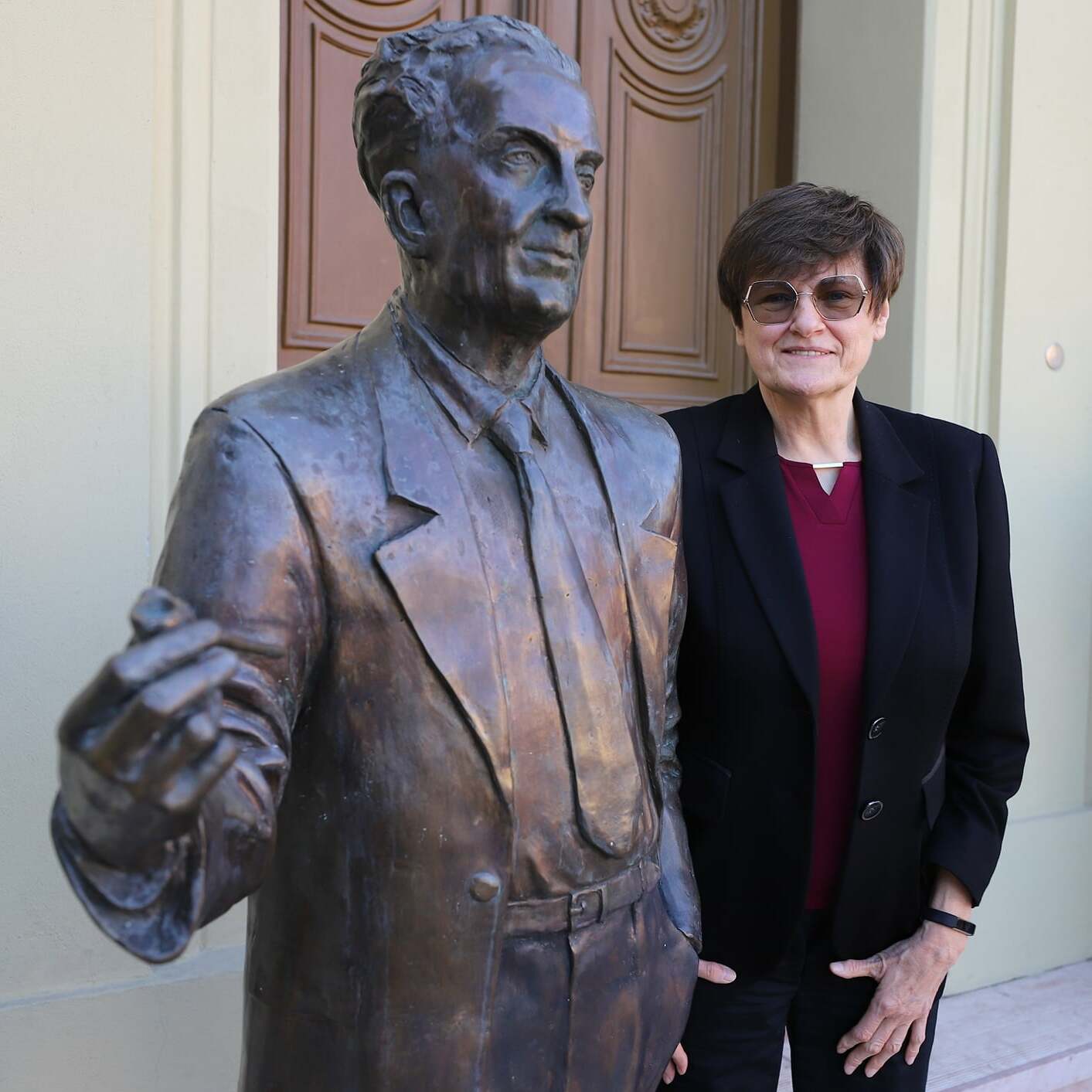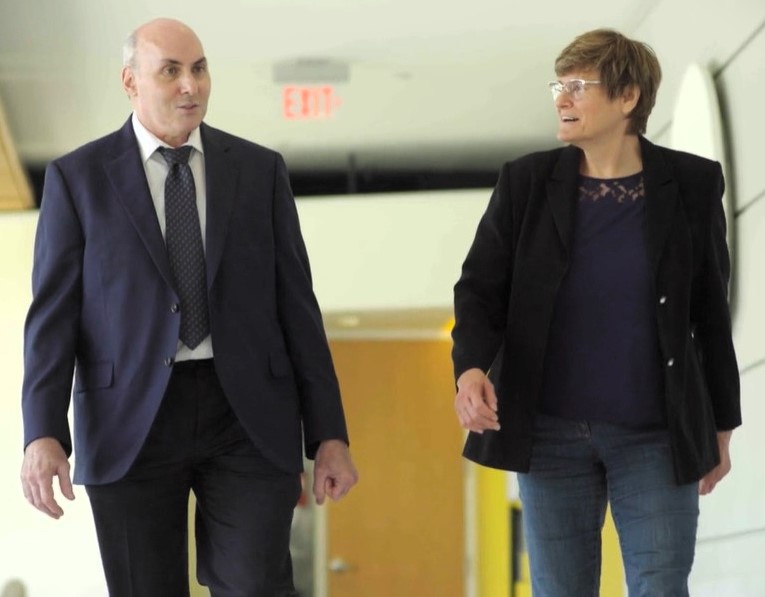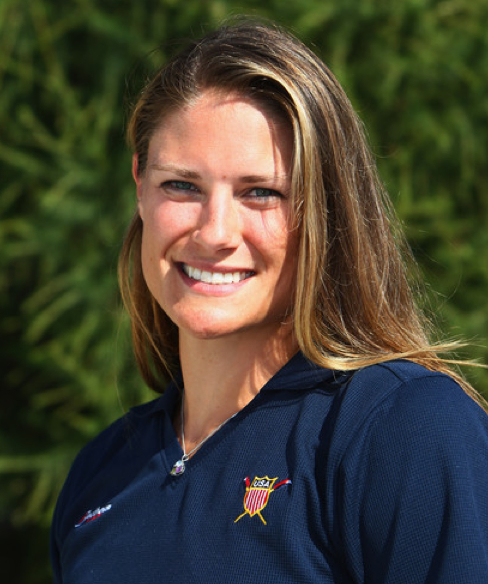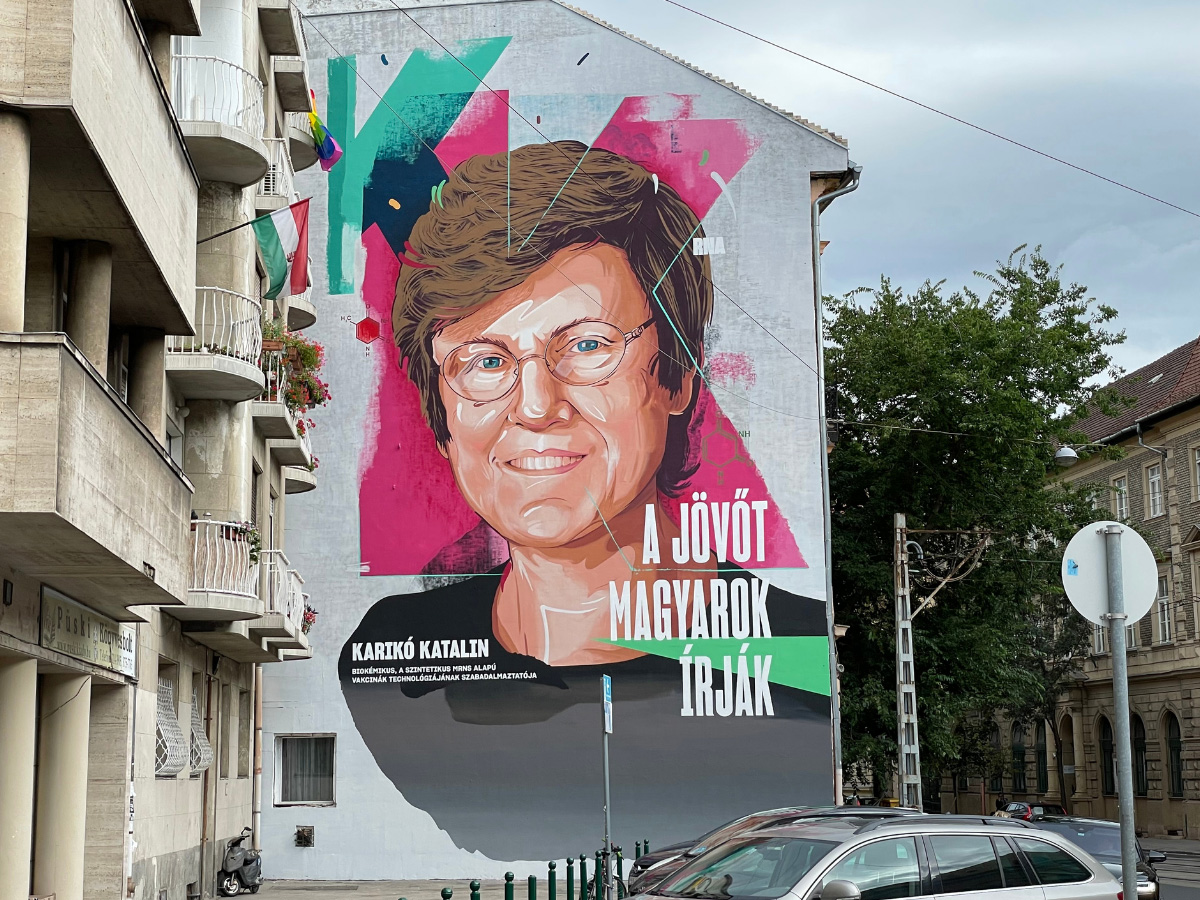1. Early Life and Education
Katalin Karikó's early life in Hungary was marked by modest conditions and a developing interest in science, which she pursued through her foundational education.
1.1. Early Life and Family Background
Katalin Karikó was born in Szolnok, Hungary, on January 17, 1955, and grew up in the small town of Kisújszállás, approximately 31 mile (50 km) east of Szolnok. Her childhood home lacked basic amenities such as running water, a refrigerator, or a television. Her father, János, worked as a butcher, while her mother was a bookkeeper. Her father faced repercussions for his involvement in the Hungarian Revolution of 1956. From a young age, Karikó displayed a strong curiosity about the natural world, particularly biology, often pondering "what is inside animals." She found the process of egg-laying by chickens to be exciting.
1.2. Education in Hungary
Karikó excelled in science during her primary education at the National Arany János Street Primary and Secondary School, achieving third place in a national biology competition in Hungary. She continued her studies at the Móricz Zsigmond Reformed College, Gymnasium, Vocational School, and Primary School, where she received the first György Jermy Award for excellence in biology. In 1973, she enrolled at the József Attila University (now the University of Szeged) in Szeged, Csongrád-Csanád County, graduating in 1978. From 1975 to 1978, she was a recipient of the "People's Republic Scholarship." She earned her Bachelor of Science degree in biology in 1978 and her Doctor of Philosophy (PhD) in biochemistry in 1982, both from the University of Szeged.
During her doctoral studies from 1978 to 1982, Karikó was a scholarship recipient of the Hungarian Academy of Sciences (MTA) and conducted her research under organic chemist Jenő Tomasz at the Institute of Biochemistry, Biological Research Centre (BRC) of Hungary. Her early research focused on RNA, particularly the discovery of nucleoside modification processes that suppress RNA immunogenicity, which opened the path for clinical applications of mRNA. While still an undergraduate in 1976, she became interested in the idea of mRNA assisting the immune system in recognizing and destroying cancer cells, a concept she encountered during a lecture at the University of Szeged.

2. Early Career and Immigration
Karikó's initial research endeavors in Hungary were met with political and financial obstacles, ultimately leading to her decision to immigrate to the United States in pursuit of scientific opportunities.
2.1. Research in Hungary
After completing her PhD, Karikó continued her postdoctoral research at the Biological Research Centre (BRC) of the Hungarian Academy of Sciences. However, the economic strain on the Hungarian People's Republic due to its socialist one-party rule led to severe budget cuts at the Szeged Centre. This financial hardship, coupled with restrictions on attending international conferences, created a challenging environment for researchers. In 1985, her lab at the BRC lost its funding, and on her 30th birthday, January 17, 1985, Karikó received a dismissal notice, leaving her unemployed. From 1978 to 1985, she was also listed as an intelligence asset by the Communist Ministry of Internal Affairs III, the Hungarian secret police. Karikó stated that she was blackmailed into this out of fear of career repercussions or reprisals against her father, and she claims she never provided information or actively served as an agent.
2.2. Move to the United States
Facing unemployment and limited prospects in Hungary, Karikó sought research opportunities abroad, writing to professors across Europe and the United States. She received a postdoctoral research position offer from Robert J. Suhadolnik at Temple University in Philadelphia. In 1985, Karikó left Hungary for the United States with her husband, Béla Francia, and their two-year-old daughter, Susan Francia. To circumvent the Hungarian government's strict currency export laws (which prohibited taking more than 100 USD worth of cash out of the country), they sold their car and exchanged the Hungarian Forint on the black market, stuffing the resulting 900 GBP into their daughter's teddy bear. Upon arrival in the U.S., with no relatives or support network, this money sustained them until her first paycheck arrived 30 days later. Her husband, an engineer, took a cleaning job to support the family, demonstrating his dedication to her scientific career. Karikó recalled that her initial week in the U.S. was challenging, noting that the university labs were less equipped than her Szeged lab, and the general living standards, such as having to use a laundromat instead of a washing machine at home, felt like a step down. She initially wanted to flee.
3. Career at the University of Pennsylvania
Karikó's tenure at the University of Pennsylvania was marked by persistent research in mRNA technology, despite facing significant skepticism, institutional hurdles, and professional setbacks, before a crucial collaboration changed the trajectory of her work.
3.1. Initial Research and Funding Struggles
Between 1985 and 1988, Karikó was a postdoctoral fellow at Temple University in Philadelphia. During this period, she participated in a clinical trial treating patients with AIDS, hematologic diseases, and chronic fatigue syndrome with double-stranded RNA (dsRNA). This was considered pioneering research, as the molecular mechanism of interferon induction by dsRNA was not yet understood, despite the known antiviral and antineoplastic effects of interferons.
In 1988, Karikó accepted a position at Johns Hopkins University. However, her lab advisor at Temple, Robert J. Suhadolnik, reacted negatively to her departure, threatening her with deportation and reporting her to U.S. immigration authorities. This led to an extradition order, which Karikó successfully challenged, but not before Johns Hopkins withdrew its job offer. Suhadolnik's continued disparagement made it difficult for her to secure new positions. She eventually found temporary work from 1988 to 1989 at the Uniformed Services University of the Health Sciences in Bethesda, Maryland, where she studied signal protein interferons and gained valuable molecular biology skills. Karikó later expressed gratitude to Suhadolnik for the initial opportunity he provided and the scientific knowledge she gained, despite the subsequent conflict.
In 1989, she was hired by the University of Pennsylvania to work with cardiologist Elliot Barnathan on messenger RNA (mRNA). As an adjunct professor at the Perelman School of Medicine at the University of Pennsylvania in 1990, Karikó submitted her first grant application proposing mRNA-based gene therapy. This marked the beginning of her primary research interest in mRNA-based therapy. However, throughout the 1990s, mRNA research fell out of favor, with many researchers, biotech companies, and pharmaceutical firms doubting its potential. Despite support from Elliot Barnathan (who left UPenn in 1997) and neurosurgeon David Langer (who later hired her), Karikó struggled to secure funding. She recounted continuously devising applications to secure government or private funding, only to be rejected by everyone. She even tried to raise capital from New York venture capitalists to establish a spin-off company, but her efforts were in vain. She once spent New Year's Eve writing grant applications for a January 6 deadline, only to be the sole rejection among seven submissions.
3.2. Demotion and Institutional Challenges
Karikó's research was consistently underfunded and undervalued. Her research funding was frequently cut, and her work was not recognized. By 1995, the University of Pennsylvania's leadership, believing her research was unproductive and lacked social significance, presented her with an ultimatum: resign or accept a demotion and pay cut from her "lab leader" position, which was on track for a full professorship with tenure. For Karikó, who aspired to a full professorship, this was a humiliating choice. She chose to remain and continue her mRNA research, accepting the demotion and significant pay reduction. Her direct supervisor, Elliot Barnathan, who was supportive of her work, had his research team disbanded due to lack of funding and left the university in 1997. His successor at Penn considered Karikó unnecessary and sought to dismiss her. She was saved by her former student, David Langer, then an intern in neurosurgery, who advocated for her to the head of the university's neurosurgery department. This move to the better-funded neurosurgery department provided her with a small lab space and an annual salary of 40.00 K USD.
During this period of demotion and uncertainty, Karikó also faced a cancer diagnosis, requiring two surgeries. Her husband was temporarily stranded in Hungary due to visa issues while obtaining his green card, unable to return for six months. Despite these immense personal and professional challenges, Karikó chose to persevere in her mRNA research, a decision that would prove pivotal. The university's skepticism stemmed from the fact that many other scientists had abandoned the field, viewing mRNA research as a waste of time. Karikó later stated that her research life at the University of Pennsylvania was stable for only two years. She noted that her work with Elliot was "too novel" to attract funding.
3.3. Collaboration with Drew Weissman
In 1997, Karikó met Drew Weissman, an immunologist who had recently joined the University of Pennsylvania. At the time, scientific publications were not yet widely available online, and copying articles from journals was the primary way for scientists to access the latest research. Weissman recalled their first encounter in 1998, saying they "found themselves fighting over the copying machine in the department." This led to conversations and a comparison of their work. Despite Karikó's low academic standing at Penn, Weissman possessed sufficient funding to support her experiments, leading to the initiation of their research collaboration. The combination of Weissman's expertise in immunology and Karikó's in biochemistry proved highly effective. They systematically advanced the technology, solving problems one by one, and eventually gained recognition. Weissman noted, "We had to fight the entire way." Karikó's exceptional persistence in the face of academic norms and challenging work conditions was widely recognized.

4. Scientific Contributions
Katalin Karikó's scientific contributions are marked by key discoveries that revolutionized mRNA technology, paving the way for its therapeutic applications, most notably in the development of COVID-19 vaccines.
4.1. Nucleoside Modification and mRNA Technology
Before 2005, a major obstacle to the therapeutic use of mRNA was that its introduction into the body (in vivo) triggered inflammatory immune reactions. A crucial insight emerged when Karikó observed that transfer RNA (tRNA), used as a scientific control in an experiment, did not provoke the same immune response as mRNA. Beginning in 2005, a series of landmark studies by Karikó and Weissman demonstrated that while synthetic mRNA was highly inflammatory, tRNA was not. They discovered that specific nucleoside modifications in mRNA could reduce this immune response by replacing uridine with pseudouridine. Their pivotal finding of a chemical modification to render mRNA non-immunogenic was initially rejected by prestigious journals like Nature and Science but was eventually accepted and published in Immunity. This breakthrough, known as the Karikó-Weissman technique, significantly enhanced the efficiency with which target proteins could be produced by mRNA within cells, making mRNA a viable therapeutic tool. In 2008, one of Karikó's co-authors, Professor Shizuo Akira of Osaka University, commented in 2023 that their Nobel Prize was "natural" and a "great contribution to humanity."
4.2. Lipid Nanoparticle Delivery
Another significant achievement by Karikó and Weissman was the development of an effective delivery technique to package mRNA within lipid nanoparticles. This novel pharmaceutical drug delivery system involves injecting mRNA into tiny fat droplets, which protect the fragile molecule until it can reach its target area in the body. They successfully demonstrated the effectiveness of this system in animal models.
4.3. Impact on COVID-19 Vaccines
Karikó and Weissman founded a small company, RNARx, and in 2006 and 2013, they secured patents for the use of several modified nucleosides to reduce the antiviral immune response to mRNA. The University of Pennsylvania subsequently sold the intellectual property license to Gary Dahl, head of a lab supply company that later became Cellscript. Weeks later, Flagship Pioneering, the venture capital firm backing Moderna, attempted to license the patent, only to find it was no longer available.
In early 2013, Karikó learned of Moderna's 240.00 M USD deal with AstraZeneca to develop a Vascular endothelial growth factor mRNA. Recognizing that her opportunities to apply her mRNA expertise at the University of Pennsylvania were limited, she accepted a position as Vice President at BioNTech RNA Pharmaceuticals in Germany, a company that had acquired the relevant patents from Cellscript. She maintained an adjunct professorship at the University of Pennsylvania. In 2017, Karikó, along with BioNTech and University of Pennsylvania researchers, demonstrated that mRNA vaccines could protect mice and monkeys from the Zika virus. By 2019, she was promoted to Senior Vice President at BioNTech.
The COVID-19 pandemic in 2020 necessitated unprecedented vaccine development, bringing their long-overlooked mRNA research into the spotlight. Thanks to their foundational work, the basic design for the COVID-19 vaccine was completed just two days after the SARS-CoV-2 genome was sequenced on January 13, 2020. Clinical trials to confirm human safety began on March 16, 2020, before the first major wave of the pandemic in Japan. Their technology was utilized in the COVID-19 vaccines produced by BioNTech (in partnership with Pfizer) and Moderna. These mRNA vaccines were developed and approved at unprecedented speed, demonstrating over 90% efficacy, and became a cornerstone in the global fight against the pandemic. Karikó stated that she was not interested in praise but rather in the fact that her research helped save lives.
4.4. Broader Applications of mRNA Technology
Karikó's research and specializations have broad implications beyond infectious disease vaccines. Her work has potential applications in areas such as the generation of pluripotent stem cells and mRNA-based gene therapy, representing a "new class of drugs." mRNA technology holds promise for treating various conditions, including cancer, cardiovascular diseases, and metabolic disorders, as well as conditions like ischemia. However, a May 2024 review on the main modification of messengers to lower the immunogenicity of mRNA therapies (the introduction of N1-methylpseudouridine), which made possible the development of mRNA vaccines against COVID-19, reported that, at least in the case of the melanoma vaccine, the introduction of 100% methylpseudouridines resulted in cancer growth and metastases compared to the unmodified mRNA vaccine.
5. Challenges and Persistence
Katalin Karikó's career is a testament to remarkable resilience and unwavering dedication to her research, despite facing significant professional obstacles, a lack of recognition, and financial difficulties for several decades. After her lab in Hungary lost funding in 1985, she immigrated to the U.S. with very limited resources, hiding her life savings in her daughter's teddy bear. Her early years in the U.S. were fraught with challenges, including a supervisor at Temple University who threatened her with deportation and sabotaged a job offer from Johns Hopkins.
At the University of Pennsylvania, she faced persistent skepticism about mRNA technology, leading to repeated grant rejections and a constant struggle for funding. In 1995, she was demoted from a tenure-track position, a deeply humiliating experience. Despite being told her work was unproductive and unsuitable for faculty, she chose to remain, accepting a significant pay cut. This period was compounded by a cancer diagnosis and her husband being stranded abroad due to visa issues. She often spent holidays like Christmas and New Year's Eve writing grant applications, only to face rejection.
Even after her pivotal collaboration with Drew Weissman and their breakthrough discovery of nucleoside modification in 2005, their findings were initially rejected by top scientific journals and went largely unnoticed by the broader scientific community. The University of Pennsylvania's decision to sell the patent rights to a small lab supply company, rather than investing in her work, further highlighted the institutional lack of foresight.
Karikó's persistence was extraordinary, defying the norms of academic research conditions where lack of funding and recognition often leads scientists to abandon their fields. She continued her research with unwavering belief in mRNA's potential, even when it meant working in a less prestigious position or relying on her collaborator's funding. Her decision to join BioNTech in Germany in 2013, after the University of Pennsylvania refused to reinstate her to a full professorship, was a critical turning point, allowing her to finally pursue her research with adequate resources. Her journey underscores the immense perseverance required to achieve scientific breakthroughs against systemic challenges and institutional skepticism.
6. Awards and Honors
Katalin Karikó has received extensive recognition for her pioneering and globally significant work in biochemistry, culminating in the Nobel Prize. She has been honored with over 130 international awards.
6.1. Nobel Prize in Physiology or Medicine
On October 2, 2023, the Nobel Assembly at Karolinska Institutet announced that the 2023 Nobel Prize in Physiology or Medicine was awarded to Katalin Karikó and Drew Weissman. They were recognized for their discoveries concerning nucleoside base modifications that enabled the development of effective mRNA vaccines against COVID-19. This achievement highlighted their foundational work, which transformed mRNA from a scientific backwater into a leading technology in the fight against global pandemics. On April 16, 2024, Katalin Karikó donated the over 500.00 K USD she received from her Nobel Prize to her alma mater, the University of Szeged.
6.2. Other Major Awards and Recognitions
Karikó has received numerous other prestigious awards, reflecting the broad impact and recognition of her scientific work. These include:
- 2020:** Public Media Person of the Year Award, Rosenstiel Award
- 2021:** Wilhelm Exner Medal, Princess of Asturias Award for Technical and Scientific Research, Széchenyi Prize, Semmelweis Prize, Hungarian Spirit Award, Human Dignity Award, Louisa Gross Horwitz Prize, Albany Medical Center Prize, Keio Medical Science Prize, Lasker-DeBakey Clinical Medical Research Award, International Paul Janssen Award for Biomedical Research, William B. Coley Award, Grand Médaille of the French Academy of Sciences, Prince Mahidol Award, German Immunology Society Award, BBVA Foundation Frontiers of Knowledge Award, Meyenburg Award, Harvey Prize, Golden Goose Award, Time Magazine's Hero of the Year, and was named one of the Time 100 most influential people. An asteroid, 166028 Karikókatalin, was named in her honor.
- 2022:** Vilcek Prize for Excellence, Breakthrough Prize in Life Sciences, Paul Ehrlich and Ludwig Darmstaedter Prize, Pearl Meister Greengard Prize, L'Oréal-UNESCO Awards for Women in Science, Benjamin Franklin Medal, Louis-Jeantet Prize for Medicine, Helmholtz Medal, Jessie Stevenson Kovalenko Medal, Japan Prize, Canada Gairdner International Award, Warren Alpert Foundation Prize, Tang Prize in Biopharmaceutical Science, and European Inventor Award.
- 2023:** Inducted into the National Inventors Hall of Fame for her research into messenger RNA.
- 2024:** Awarded the Paul Karrer Gold Medal and included on the BBC's 100 Women list. She was also named in the 2024 Time 100 influential people in health.
7. Personal Life
Katalin Karikó is married to Béla Francia, an engineer who took a cleaning job in Philadelphia to support her research career after their immigration to the U.S. They are the parents of Susan Francia, a two-time Olympic gold medalist rower. Susan Francia won gold medals for the U.S. rowing team in the women's eight at the 2008 Beijing Olympics and the 2012 London Olympics. Karikó's daughter, who was two years old when they immigrated, later commented that her mother became famous as "the scientist who saved the world" after being known as "the mother of a gold medalist." Karikó's grandson, born to Susan Francia and her son-in-law, architect Ryan Amos, was born in the U.S. in February 2021. Karikó's mother passed away in 2018.

8. Public Recognition and Memoir
Katalin Karikó's work gained widespread public attention following the success of mRNA COVID-19 vaccines, leading to numerous media features and publications about her life and scientific journey.
In April 2021, The New York Times featured her career, highlighting how her work laid the groundwork for mRNA vaccines to combat the COVID-19 pandemic. On June 10, 2021, The Daily podcast from The New York Times further emphasized the many challenges she overcame before her work was recognized. In November 2021, the US online publication Glamour named her a Woman of the Year.

In 2023, two children's books were released about her: Never Give Up: Dr. Kati Karikó and the Race for the Future of Vaccines by Debbie Dadey and Juliana Oakley, and Kati's Tiny Messengers: Dr. Katalin Karikó and the Battle Against COVID-19 by Megan Hoyt and Vivien Mildenberger.
Katalin Karikó's autobiography, Breaking Through: My Life in Science, was published by Crown Publishing Group on October 10, 2023, just days after she won the Nobel Prize. The book became the best-selling non-fiction book in Hungary in 2023 and was awarded the Libri Literary Prize in June 2024. By that time, her memoir had been translated into nine languages.
Karikó has also made public appearances, including a visit to Japan in April 2022 for the Japan Prize award ceremony, where she stated, "I am not interested in receiving praise. What makes me happy is that someone was saved by my research." She signed an autograph for a Japanese reporter, writing, "I wish everyone in Japan happiness." In October 2022, the Hungarian Embassy in Japan hosted an exhibition about Katalin Karikó, with cooperation from Keio University School of Medicine.
9. Selected Publications
- "mRNA is an endogenous ligand for Toll-like receptor 3" (2004) - Katalin Karikó, Houping Ni, John Capodici, Marc Lamphier, Drew Weissman
- "Inhibition of toll-like receptor and cytokine signaling-a unifying theme in ischemic tolerance" (2004) - Katalin Karikó, Drew Weissman, Frank A. Welsh
- "Suppression of RNA Recognition by Toll-like Receptors: The Impact of Nucleoside Modification and the Evolutionary Origin of RNA" (2005) - Katalin Karikó, Michael Buckstein, Houping Ni, Drew Weissman
- "Incorporation of pseudouridine into mRNA yields superior nonimmunogenic vector with increased translational capacity and biological stability" (2008) - Katalin Karikó, Hiromi Muramatsu, Frank A. Welsh, János Ludwig, Hiroki Kato, Shizuo Akira, Drew Weissman
- "Incorporation of pseudouridine into mRNA enhances translation by diminishing PKR activation" (2010) - Bart R. Anderson, Hiromi Muramatsu, Subba R. Nallagatla, Philip C. Bevilacqua, Lauren H. Sansing, Drew Weissman, Katalin Karikó
10. Related Figures and Topics
- Drew Weissman
- Uğur Şahin - co-founder of BioNTech
- Özlem Türeci - co-founder of BioNTech
- RNA vaccine
- Nucleoside-modified messenger RNA
- Tozinameran - COVID-19 vaccine from Pfizer BioNTech, sold under the brand name Comirnaty
11. External links
- [https://www.nobelprize.org/laureate/katalin-kariko Katalin Karikó on NobelPrize.org]
- [https://scholar.google.com/citations?user=PS_CX0AAAAAJ Katalin Karikó on Google Scholar]
- [https://mediateka.ek.szte.hu/exhibits/show/katalin_kariko_eng/bio Katalin Karikó - University of Szeged Klebelsberg Library virtual exhibition: life and research]
- [https://www.linkedin.com/in/katalin-karik%C3%B3-a6b457a/ Katalin Karikó on LinkedIn]